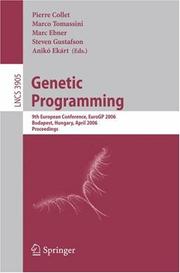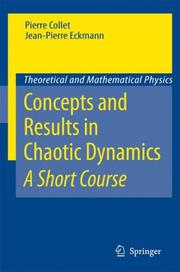| Listing 1 - 8 of 8 |
Sort by
|

ISBN: 9783540331438 3540331433 3540331441 Year: 2006 Publisher: Berlin ; New York : Springer,
Abstract | Keywords | Export | Availability | Bookmark
 Loading...
Loading...Choose an application
- Reference Manager
- EndNote
- RefWorks (Direct export to RefWorks)
This book constitutes the refereed proceedings of the 9th European Conference on Genetic Programming, EuroGP 2006, held in Budapest, Hungary, in April 2006, colocated with EvoCOP 2006. The 21 revised plenary papers and 11 revised poster papers were carefully reviewed and selected from 59 submissions. The papers address fundamental and theoretical issues, along with a wide variety of papers dealing with different application areas, such as computer science, engineering, machine learning, Kolmogorov complexity, biology and computational design, showing that GP is a powerful and practical problem-solving paradigm.
Genetic programming (Computer science) --- Programmation génétique (Informatique) --- Congresses. --- Congrès --- Computer Science --- Engineering & Applied Sciences --- Information Technology --- Computer Science (Hardware & Networks) --- Computer science. --- Software engineering. --- Computer programming. --- Computers. --- Algorithms. --- Artificial intelligence. --- Pattern recognition. --- Computer Science. --- Software Engineering/Programming and Operating Systems. --- Programming Techniques. --- Computation by Abstract Devices. --- Algorithm Analysis and Problem Complexity. --- Pattern Recognition. --- Artificial Intelligence (incl. Robotics). --- Design perception --- Pattern recognition --- Form perception --- Perception --- Figure-ground perception --- AI (Artificial intelligence) --- Artificial thinking --- Electronic brains --- Intellectronics --- Intelligence, Artificial --- Intelligent machines --- Machine intelligence --- Thinking, Artificial --- Bionics --- Cognitive science --- Digital computer simulation --- Electronic data processing --- Logic machines --- Machine theory --- Self-organizing systems --- Simulation methods --- Fifth generation computers --- Neural computers --- Algorism --- Algebra --- Arithmetic --- Automatic computers --- Automatic data processors --- Computer hardware --- Computing machines (Computers) --- Electronic calculating-machines --- Electronic computers --- Hardware, Computer --- Computer systems --- Cybernetics --- Calculators --- Cyberspace --- Computers --- Electronic computer programming --- Electronic digital computers --- Programming (Electronic computers) --- Coding theory --- Computer software engineering --- Engineering --- Informatics --- Science --- Foundations --- Programming --- Computer programming --- Genetic algorithms --- Computer software. --- Optical pattern recognition. --- Artificial Intelligence. --- Software, Computer --- Optical data processing --- Pattern perception --- Perceptrons --- Visual discrimination --- Pattern recognition systems. --- Software Engineering. --- Theory of Computation. --- Automated Pattern Recognition. --- Pattern classification systems --- Pattern recognition computers --- Computer vision

ISBN: 3540347062 3540347054 Year: 2006 Publisher: Berlin, Heidelberg : Springer Berlin Heidelberg : Imprint: Springer,
Abstract | Keywords | Export | Availability | Bookmark
 Loading...
Loading...Choose an application
- Reference Manager
- EndNote
- RefWorks (Direct export to RefWorks)
The study of dynamical systems is a well established field. The authors have written this book in an attempt to provide a panorama of several aspects, that are of interest to mathematicians and physicists alike. The book collects the material of several courses at the graduate level given by the authors. Thus, the exposition avoids detailed proofs in exchange for numerous illustrations and examples, while still maintaining sufficient precision. Apart from common subjects in this field, a lot of attention is given to questions of physical measurement and stochastic properties of chaotic dynamical systems.
Differentiable dynamical systems. --- Differential equations. --- 517.91 Differential equations --- Differential equations --- Differential dynamical systems --- Dynamical systems, Differentiable --- Dynamics, Differentiable --- Global analysis (Mathematics) --- Topological dynamics --- Mathematical physics. --- Dynamical Systems and Ergodic Theory. --- Mathematical Methods in Physics. --- Physical mathematics --- Physics --- Mathematics --- Dynamics. --- Ergodic theory. --- Physics. --- Ergodic transformations --- Continuous groups --- Mathematical physics --- Measure theory --- Transformations (Mathematics) --- Dynamical systems --- Kinetics --- Mechanics, Analytic --- Force and energy --- Mechanics --- Statics --- Natural philosophy --- Philosophy, Natural --- Physical sciences --- Dynamics
Digital
ISBN: 9783540347064 Year: 2006 Publisher: Berlin Heidelberg Springer-Verlag GmbH
Abstract | Keywords | Export | Availability | Bookmark
 Loading...
Loading...Choose an application
- Reference Manager
- EndNote
- RefWorks (Direct export to RefWorks)
Ergodic theory. Information theory --- Mathematical physics --- wiskunde --- fysica --- informatietheorie
Book
ISBN: 9783540347064 Year: 2006 Publisher: Berlin Heidelberg Springer-Verlag GmbH.
Abstract | Keywords | Export | Availability | Bookmark
 Loading...
Loading...Choose an application
- Reference Manager
- EndNote
- RefWorks (Direct export to RefWorks)
The study of dynamical systems is a well established field. The authors have written this book in an attempt to provide a panorama of several aspects, that are of interest to mathematicians and physicists alike. The book collects the material of several courses at the graduate level given by the authors. Thus, the exposition avoids detailed proofs in exchange for numerous illustrations and examples, while still maintaining sufficient precision. Apart from common subjects in this field, a lot of attention is given to questions of physical measurement and stochastic properties of chaotic dynamical systems.
Ergodic theory. Information theory --- Mathematical physics --- wiskunde --- fysica --- informatietheorie
Digital
ISBN: 9783540331445 Year: 2006 Publisher: Berlin Heidelberg Springer-Verlag GmbH
Abstract | Keywords | Export | Availability | Bookmark
 Loading...
Loading...Choose an application
- Reference Manager
- EndNote
- RefWorks (Direct export to RefWorks)
Complex analysis --- Mathematical statistics --- Biology --- Computer science --- Programming --- Artificial intelligence. Robotics. Simulation. Graphics --- Computer. Automation --- patroonherkenning --- factoranalyse --- complexe analyse (wiskunde) --- biologie --- informatica --- programmeren (informatica) --- KI (kunstmatige intelligentie) --- robots --- AI (artificiële intelligentie)
Book

ISBN: 9783540331445 Year: 2006 Publisher: Berlin Heidelberg Springer-Verlag GmbH.
Abstract | Keywords | Export | Availability | Bookmark
 Loading...
Loading...Choose an application
- Reference Manager
- EndNote
- RefWorks (Direct export to RefWorks)
The present volume contains the contributions for the 9th European Conference on Genetic Programming (EuroGP 2006). The conference took place during April 10-12, 2006 in Budapest, Hungary. EuroGP is a well-established conf- ence and the only one exclusively devoted to genetic programming worldwide. EuroGP began as a workshopin 1998 in Paris, and has been held annually since then,becomingaconferenceinEdinburghin2000.Allpreviousproceedingshave been published by Springer in the Lecture Notes in Computer Science series. More recently, EuroGP has been co-located with EvoCOP 2006, the 6th Eu- pean Conference on Evolutionary Computation in Combinatorial Optimization, and the EvoWorkshops, focusing on applications of evolutionary computation, resulting in the largest combined event dedicated to evolutionary computation in Europe. Genetic programming (GP) is evolutionary computation that solves complex problems or tasks by evolving and adapting a population of computer programs, using Darwinian evolution and Mendelian genetics as its sources of inspiration. The 32 papers included in these proceedings address fundamental and theore- cal issues, along with a wide variety of papers dealing with di?erent application areas,suchascomputerscience,engineering,machinelearning,Kolmogorovc- plexity, biology and computational design, showing that GP is a powerful and practical problem-solving paradigm. A rigorous, double-blind, selection mechanism was applied to 59 submitted papers,thatresultedintheacceptanceof21plenarytalks(36%acceptancerate) and 11 poster presentations (54% global acceptance rate for talks and posters).
Complex analysis --- Mathematical statistics --- Biology --- Computer science --- Programming --- Artificial intelligence. Robotics. Simulation. Graphics --- Computer. Automation --- patroonherkenning --- factoranalyse --- complexe analyse (wiskunde) --- biologie --- informatica --- programmeren (informatica) --- KI (kunstmatige intelligentie) --- robots
Book

ISBN: 9783540335900 Year: 2006 Publisher: Berlin Heidelberg Springer-Verlag GmbH.
Abstract | Keywords | Export | Availability | Bookmark
 Loading...
Loading...Choose an application
- Reference Manager
- EndNote
- RefWorks (Direct export to RefWorks)
This book is based on the best papers presented at the 7th Conference on - ti?cial Evolution, EA 2005, held in Lille (France). Previous EA meetings took place in Marseille (2003), Le Creusot (2001), Dunkerque (1999), Nimes (1997), Brest (1995), and Toulouse (1994). There were 78 submitted papers, of which 27 were selected for presen- tion.Theycoverallaspectsofarti?cialevolution:geneticprogramming,machine learning, combinatorial optimization, co-evolution, self-assembling, arti?cial life and bioinformatics. Inaddition, the programincluded aninvited talkbyDavidCorneonEvo- tionary Computation in Bioinformatics: How to Save Lives and Make Scienti?c Breakthrough. Thanks to the Organizing Committee and the Steering Committee for their hard work. All the submissions were reviewed by at least three members of the Program Committee. I am very grateful to the members for their conscientious work. We take this opportunity to thank the di?erent partners whose ?nancial and material support contributed to the success of the conference: Polytech'Lille, Universit´ e des Sciences et Technologies de Lille, INRIA, AFIA, CNRS, R´ egion Nord-Pas-De-Calais, ROADEF, and EA association. Finally, I wish to thank all the authors who submitted papers, and the - thors of accepted papers for sending their ?nal versions on time.
Complex analysis --- Mathematical statistics --- Evolution. Phylogeny --- Computer science --- Artificial intelligence. Robotics. Simulation. Graphics --- Computer. Automation --- patroonherkenning --- factoranalyse --- complexe analyse (wiskunde) --- informatica --- Europees recht --- KI (kunstmatige intelligentie) --- robots --- numerieke analyse
Digital
ISBN: 9783540335900 Year: 2006 Publisher: Berlin Heidelberg Springer-Verlag GmbH
Abstract | Keywords | Export | Availability | Bookmark
 Loading...
Loading...Choose an application
- Reference Manager
- EndNote
- RefWorks (Direct export to RefWorks)
Complex analysis --- Mathematical statistics --- Evolution. Phylogeny --- Computer science --- Artificial intelligence. Robotics. Simulation. Graphics --- Computer. Automation --- patroonherkenning --- factoranalyse --- complexe analyse (wiskunde) --- informatica --- Europees recht --- KI (kunstmatige intelligentie) --- robots --- numerieke analyse --- AI (artificiële intelligentie)
| Listing 1 - 8 of 8 |
Sort by
|

 Search
Search Feedback
Feedback About UniCat
About UniCat  Help
Help News
News